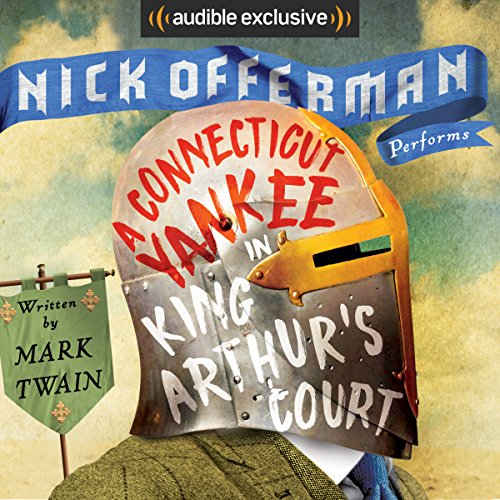
Praise for Nick Offerman narrating Mark Twain:
“Offerman’s Illinois-raised voice and actor’s talent suit him ideally to channel Mark Twain.” (The New York Times Book Review)
“There’s something about his wry Midwestern merriment that aspires to Twainishness.” (Men’s Journal)
“It’s a melding of sardonic voices: Mark Twain, meet Nick Offerman.” (The Wall Street Journal)
With his trademark mirth and boundless charisma, actor Nick Offerman brought the loveable shenanigans of Twain’s adolescent hero to life in The Adventures of Tom Sawyer. Now, in yet another virtuosic performance, the actor proves that despite being separated by a span of over a century, his connection to the author and his work is undeniable and that theirs is a timeless collaboration that should not be missed. Trading in the idyllic banks of Twain’s Mississippi for medieval England, Offerman regales listeners with one of American literature’s foremost satires and the author’s most inventive and darkly funny pieces of fiction.
Hank Morgan is the archetype of modern man in 19th-century New England: adept at his trade as a mechanic, innovative, forward thinking. So when a blow to the head inexplicably sends him back in time 1300 years and places him in Camelot, instead of despair, he feels emboldened by the prospect placed before him and sets out to modernize and improve the lives of his fellow citizens. But, in order to do so, he’ll need to contend with brash nobles, superstitious nincompoops, and a conniving, blowhard wizard.
While time travel has become a common trope in storytelling today, in Twain’s time it was truly a novel idea; all the more imaginative when you consider how it’s used for satirical effect. A thinly veiled critique of the political and social institutions that impede progress and a scathing condemnation of the naiveté that allows them to thrive, A Connecticut Yankee in King Arthur’s Court saw Twain’s biting wit and sharp tongue honed to a fine point.
Told primarily through Hank’s first-person perspective, Offerman effortlessly captures the Yankee’s straightforward, matter-of-fact gruffness. Like Offerman – whose woodworking skills are the stuff of legend – Hank is a natural builder of things and his can-do, by-the-bootstraps spirit finds its vocal foil in Offerman’s crisp delivery. But it’s in Offerman’s ability to convey the myriad characters and absurdities Hank faces that makes this an incomparable listening experience: the flowery embellishments and insane braggadocio of knights; the lilting, feathery sing-song of Clarence; the garrulous, long-winded pomp of the aristocracy; the old, dithering windbag pronouncements of Merlin. Offerman plays each of these with a humor and humanity that Twain himself would have enjoyed.

Funny, wise, and naive The unquestionable master Sam Clemens, Mark Twain, wrote this marvelous piece to lampoon monarchy and organized religion. He also intended a large advertisement for science, technology, capitalism, and democracy. Well done. And the touches of Twain’s acid-tongued humor make me laugh out loud.After being hit in the head so hard that it “seemed to spring every joint in my skull and made it overlap its neighbor”, Hank Morgan, a citizen of late-19th-century Connecticut, finds himself…
Incomplete and poorly formatted This is not a complete copy of the book, and it is poorly formatted. It is missing the initial “A Note of Explanation”, in which Twain tells his tale of meeting a stranger in Warwick Castle, who gives him a journal that recounts the body of the book. If you haven’t read Connecticut Yankee before, you may have some difficulty picking up the thread of the narrative. And if you have read it, you will know something is missing. I don’t recommend this copy of the book–there are free…
The witty mind of Mark Twain Twain’s time travel tale takes us back to the time of King Author and the Knights of the Round Table. Unlike most glamorous takes on the old tale, Twain paints a picture of absurdity, superstition, and human misery. The honor culture of brave knights and fair maidens is revealed to be a place of incredible ignorance, extreme poverty, and shameful inequality. The narrator of the book, Hank, finds himself unexplainably in sixth century England, where he quickly asserts himself as a magician by…